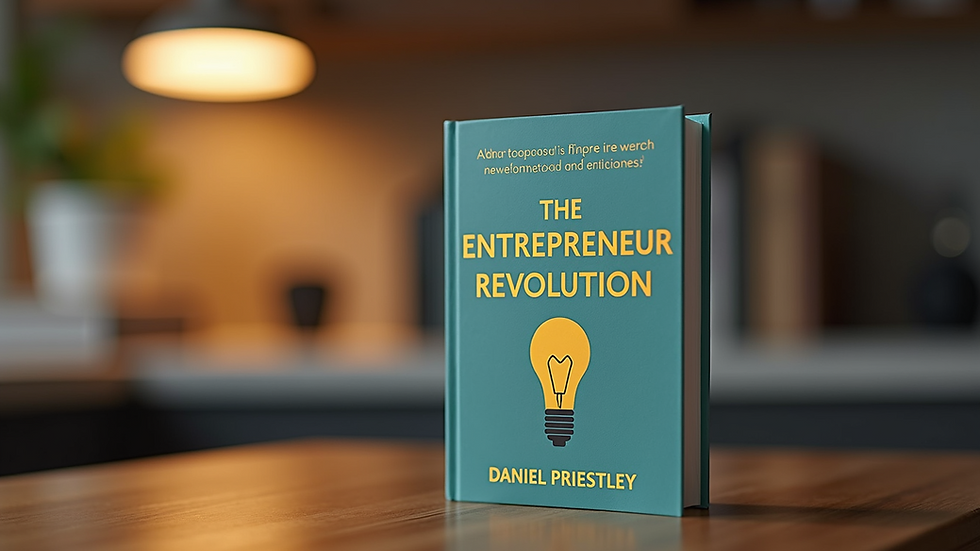A Comprehensive Review of The Entrepreneur Revolution by Daniel Priestley: Insights for Aspiring Innovators
- Leslie Quinn
- May 22, 2025
- 6 min read
Updated: Jun 9, 2025
In today’s fast-paced world, fostering an entrepreneurial mindset is crucial for success. In Entrepreneur Revolution: How to Develop Your Entrepreneurial Mindset and Start a Business That Works, Daniel Priestley outlines a compelling case for why now—more than ever—is the time to break away from the industrial-age mindset and step into the entrepreneurial age. Daniel Priestley presents a refreshing look at the changing world of entrepreneurship packed with practical insights and relatable stories, this book serves as a guide for anyone who wants to succeed in today’s innovation-driven economy. As we explore this review, let’s delve into the key concepts introduced by Priestley and discover why this book is essential for aspiring entrepreneurs and those thinking about creating financial security.
Understanding the Shifting Landscape
Priestley begins by highlighting how quickly the global economy is changing the way business operates. In the past, many people followed traditional career paths that promised job security and steady promotions. However, with the rise of technology and digital platforms, a new form of entrepreneurship has emerged. This new landscape favors flexibility and adaptability.
Today’s entrepreneurs must harness their personal skills and passions to create impactful businesses. For example, small businesses that have successfully tapped into e-commerce have seen their sales rise by over 30% in the past few years. This shift shows the need for adaptability and use of global resources for manufacturing, sales and distribution. By identifying market trends and embracing change, aspiring innovators can carve out their own niches and deliver real value.
A Shift in Mindset: From Worker to Creator
At the heart of Priestley’s book is a call to action: “Stop waiting for permission and start building something of value.” The book champions the idea that we are no longer cogs in a machine, but creators in a digital, global, and hyper-connected marketplace. He explains how technology has leveled the playing field and why resourcefulness, creativity, and adaptability are the most valuable currencies in the new economy.
Priestley invites readers to embrace a "global small business" model, where even solo entrepreneurs can reach international audiences, compete with established players, and scale operations without a huge corporate infrastructure. This is particularly powerful for knowledge workers, coaches, consultants, and digital creators.
The Three Types of Entrepreneurs
Priestley categorizes entrepreneurs into three distinct groups:
Opportunistic Entrepreneurs recognize market gaps and seize opportunities. For instance, during the pandemic, many restaurants pivoted to delivery services and meal kits, which helped them remain profitable.
Aspiring Entrepreneurs are those bubbling with ideas but lacking the experience to execute them. This group often needs mentoring and support, which can significantly enhance their chances of success. A survey revealed that 70% of first-time entrepreneurs feel overwhelmed without guidance.
Established Entrepreneurs have successful ventures and are focused on growth or innovation. These individuals typically look for advanced strategies to maintain their business edge. For example, tech companies continuously research consumer feedback to refine their products and services.
Identifying where you fit in these categories helps clarify your next steps on your entrepreneurial journey.
Cultivating the Entrepreneurial Mindset
A key theme of Priestley’s book is the significance of an entrepreneurial mindset. He argues that successful entrepreneurs are those who embrace adaptation and failure as a part of the journey. Not all individuals are ready for entrepreneurship but should be as it can be rewarding, providing the financial security and opportunity that the 9-5 work is no longer providing.
Viewing setbacks as learning experiences allows entrepreneurs to build resilience and stay motivated. This mindset empowers individuals to find creative solutions and see challenges as opportunities for growth. For instance, startups that iterate on feedback from failures often increase their likelihood of success by 25%.
Additionally, Priestley emphasizes the importance of ongoing learning. In a world where information is plentiful, the ability to adapt and learn can distinguish those who thrive from those who merely survive in business.
An entrepreneurial mindset is not just about business ideas; it's about fostering a way of thinking that prioritizes innovation, problem-solving, and determination.
Building Your Brand
Priestley places significant emphasis on personal branding as a cornerstone of entrepreneurial success. He believes that a strong personal brand is essential for attracting your ideal customers. When entrepreneurs align their personal values with their business goals, they can engage their audience more effectively.
For example, entrepreneurs in the health and wellness industry who incorporate their personal journeys into their branding often see higher engagement. Thinking carefully about your core message and unique value can make a substantial difference.
Crafting a compelling story around your brand resonates more deeply than a basic pitch. Entrepreneurs who effectively share their narratives can stand out in crowded markets, securing loyal customers. This section illustrates the importance of being intentional about branding in a genuine way that truly reflects one's vision and mission.
The Importance of Networking
Networking is another vital theme in "The Entrepreneur Revolution." Priestley urges entrepreneurs to build and maintain strong relationships within their industries. The right connections can lead to valuable partnerships, mentorships, and opportunities.
Priestley’s approach to networking emphasizes meaningful interactions based on respect and collaboration. Instead of treating networking as mere self-promotion, he advocates for sincere engagement and support.
He shares practical networking strategies, such as attending industry events and utilizing online platforms like LinkedIn to connect with like-minded individuals. By investing time in these connections, entrepreneurs can nurture a supportive network that enhances their growth and success.
Taking Action
At the heart of Priestley’s message is the call to action. Many aspiring entrepreneurs find themselves stalled in the planning phase, overwhelmed by uncertainties.
To combat this, Priestley suggests breaking down goals into manageable tasks and taking consistent steps towards achieving them. Recognizing that the road to success is rarely smooth encourages readers to embrace imperfection. By simply taking action—from launching a website to testing a product—entrepreneurs can gain insights, gain experience, and refine their strategies.
This reminder that success is not only about perfect plans but about having the courage to take that first step is especially empowering.
Leveraging Technology
Given the rapid advancement of technology today, Priestley highlights its crucial role in entrepreneurship. He discusses various technological tools that can help entrepreneurs scale their businesses effectively.
From using project management tools to utilizing social media analytics, the right technology can help streamline processes and inform decisions. For instance, companies that implement data-driven strategies see a 20% increase in their efficiency.
Staying updated with the latest technological trends allows entrepreneurs to discover new collaboration opportunities and reach larger audiences. Integrating technology thoughtfully into a business model can offer a competitive advantage and facilitate sustainable growth.
Core Concepts from Entrepreneur Revolution
The Rise of the Global Village: Priestley explains how the economy has shifted from the Industrial Age to the Entrepreneurial Age. With the proliferation of the internet and social platforms, every individual now has access to global markets and audiences.
The Power of Intellectual Property:-The book places a heavy emphasis on building assets—specifically intellectual property. Whether it's writing a book, creating a course, designing a system, or developing a methodology, the value lies in owning and scaling your ideas.
Leveraging Personal Brand: One of the most actionable elements is the importance of cultivating a personal brand. People buy from people they know, like, and trust. As such, positioning yourself as an authority in a niche is no longer optional—it’s essential.
The 'Key Person of Influence' Blueprint: Though expanded upon in Priestley’s other works, this book introduces the idea of becoming a “Key Person of Influence” (KPI) in your industry. KPIs attract opportunity, premium clients, and scalable business deals, all because they’ve strategically positioned themselves in the marketplace.
Entrepreneurial Flow and Lifestyle Design: Beyond business mechanics, Priestley touches on creating a lifestyle that supports creativity, agility, and high performance. Entrepreneurship is not just a career—it’s a way of life.
Practical Takeaways for Readers
Identify a micro-niche where you can offer unique value.
Create intellectual property that positions you as a thought leader.
Automate and delegate to stay in your zone of genius.
Leverage tools, technology, and teams to scale globally.
Embrace entrepreneurship as both a mindset and a method for life design.
Why This Book Matters—Especially Now
Whether you are a seasoned entrepreneur or just beginning to explore starting your own business, Entrepreneur Revolution serves as both a motivational guide and a strategic roadmap. Priestley doesn’t just theorize—he lays out clear, actionable steps to help you build a business that thrives in the new economy.
In a time where side hustles are the norm, traditional job security is waning, and autonomy is more accessible than ever, Priestley’s work is both timely and timeless.
Final Thoughts-
Embracing the Entrepreneurial Journey
“The Entrepreneur Revolution” by Daniel Priestley is not just a guide for aspiring entrepreneurs; it serves as an essential resource for anyone committed to innovation and growth. Entrepreneur Revolution is more than a book—it’s a mindset shift. It challenges you to think bigger, act faster, and build smarter. It reinforces that in today’s world, success is no longer reserved for the privileged few with capital—it’s available to anyone willing to lead with value, adapt quickly, and build intellectual assets.
In exploring the changing landscape of entrepreneurship, the value of a resilient mindset, and the importance of personal branding, meaningful networking, and leveraging technology, Priestley provides actionable insights that are both practical and motivational.
As you step into your entrepreneurial journey, remember that this revolution calls for open-minded individuals ready to innovate, adapt, and succeed. If you would like to learn more about our Business Success Membership, where we can help you move forward on your path to Entrepreneurship, check out our Founding Members' Launch.
If you’re ready to take your ideas to the next level and want a clear, modern framework to follow, this book should be on your shelf.





Comments